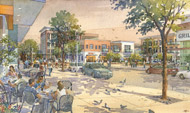|
COVER STORY, MARCH 2011
RECAPTURING THE CAROLINAS
Retail in the Carolinas recovers as boxes are backfilled and consumers regain their footing.
Randall Shearin
As one of the fastest growing markets during the 2000s, the Carolinas’ stability was heavily tested during the recession. While the states weathered a tough storm, they have emerged with some strong markets and some areas that are expanding. Unfortunately, the Carolinas also have some of the highest unemployment rates in the 50 states, hovering around 10 percent, shaking consumer spending power.
Eastern North Carolina is seeing growth caused by the area’s military bases, which stretch from Fayetteville to Jacksonville to Havelock, says H.J. Brody, president of Greenville, North Carolina-based Brody Co. Retailers and developers also see strength in strong markets like Raleigh, Charlotte, Greenville and Charleston, says Mike Wiggins, senior vice president of retail development for Charlotte-based Crosland.
“The retail sector is in a rebuilding year, and we will muddle along through most of 2011,” says Wiggins. “Job growth and elevated consumer confidence will go a long way toward quickening the pace of new development.”
Owners and developers who have stabilized projects are seeing good sales.
“The comparable sales trend is positive,” says Robert Spratt, president and CEO of Charlotte-based Hill Partners. “The shoppers are back in the stores purchasing. They are not going crazy, but they are purchasing.”
In the Charlotte area, sales have picked up now that the banks — the area’s largest employer — have stabilized. Belk announced a major expansion at Madison Marquette’s Monroe Crossing in Monroe. The department store will expand its location there from 65,000 square feet to 95,000 square feet.
“Belk was founded in Monroe and is recommitting to the market by doing this major expansion and full store remodel,” says Denise Browning, vice president of leasing for Madison Marquette. “It is a great catalyst for the center, which is the only enclosed center in Union County.”
Browning says that she is also in talks with another department store for expansion in the Carolinas, and sees this as a trend.
“Department stores are putting a lot of capital out there to expand and remodel their stores,” she says. “That is a positive sign, since department stores were one of the first categories to decline as we headed into the recession. Now, they are re-engaged.”
Madison Marquette has also seen a lot of activity from retailers at Monroe Crossing and its other centers in North Carolina, which include the Morrison mixed-use community in Charlotte and University Mall in Chapel Hill.
Crosland’s Wiggins also sees tenants expanding in the market. He reports tenants like Family Dollar, Dollar General, Goodwill, O’Reilly’s and QuikTrip looking to expand.
“These tenants are looking for a solid return on investment and discounted price on land/rent,” says Wiggins.
In Eastern North Carolina, H.J. Brody is also seeing activity at his centers. At Mayfair Town Center in Wilmington, Brody Co. saw an 8 percent increase in sales in 2010. The 800,000-square-foot center has also seen new tenants arrive in the last 2 years. Mayfair lost its Linens ‘N Things when the retailer went bankrupt, and filled that space with an hhgregg store. Other new tenants include New Balance, Zoës Kitchen and Happy Days Diner. Similarly, Brody Co.’s Crystal Coast Plaza in Morehead City, North Carolina, has seen new tenants join the 225,000-square-foot center. In 2010, West Marine, Buffalo Wild Wings and Olive Garden opened. In Brody Co.’s hometown of Greenville, North Carolina, East Carolina University is opening a dental school, which is bringing new faculty and staff to town. Brody is 97 percent leased at its centers in Greenville.
“People have begun to save and have better job security,” says Brody. “Consumers are gradually getting optimistic here.”
Brody also adds that the area’s military bases, such as Camp Lejeune in Jacksonville and Cherry Point Marine Corps Air Station in Havelock, have added to Eastern North Carolina’s stability as they add personnel.
Shane Bull, real estate advisor at Grubb & Ellis|Thomas Linderman Graham in Raleigh, says that the Fayetteville market is also poised to do well with the impending growth of the town’s chief economic driver, Fort Bragg.
Jim Anthony, CEO of Colliers International/Anthony & Co., in Raleigh, says North Carolina’s capital is also a strong market. Anthony reports that most retailers looking at the market look first to the area’s strongest sub-market, centered around Crabtree Valley Mall. The area near the Streets at South Point in Durham is also strong. Next on the list is the area around Triangle Town Center in North Raleigh, followed closely by the area near Cary Towne Center and Crossroads Plaza in Cary.
Anthony reports a lot of retail activity has been the backfilling of vacant space.
“While the last 2 years have been the slowest in the last 30 years here, almost all Linens ‘N Things and Circuit City locations were backfilled pretty quickly,” he says. “That is impressive.”
Anthony reports tenants like health clubs, Nordstrom Rack and Ollie’s took most of the space. As well, The Container Store took a Circuit City space near Crabtree Valley Mall.
Bull echoes Anthony’s assessment of the big box market:
“Kirklands, Ollie’s, Home Goods, The Container Store and Big Lots are examples of nationals who are taking advantage of available big boxes in good locations at great rental rates. [Tenants] want a deal for prime space. As a result, Class A locations have witnessed the majority of recent leasing activity, and those options are quickly becoming limited while older centers are struggling to hold on to tenants.”
Several new projects are under development or have recently been completed in the Raleigh-Durham market, mostly in the area’s strong suburban markets. Regency Centers and WelCor Development are developing the Market at Colonnade, a 57,000-square-foot Whole Foods-anchored center at Six Forks Road and Colonnade Center Drive in Raleigh. Panera Bread will also join the tenant list at the LEED-certified center. Regency and WelCor are also developing Harris Crossing, a Harris Teeter-anchored center that will be 65,000 square feet in Wake Forest. In Johnston County, Ashland Construction is developing a 65,000-square-foot Food Lion-anchored center in Clayton.
 |
Casto and 1st Carolina Properties are developing Park West Village in Morrisville, North Carolina. The first phase, anchored by Target, TJ Maxx and buybuy BABY is scheduled to open in 2011.
|
|
One of the largest developments under way in the area is Park West Village in Morrisville, being developed by Casto and 1st Carolina Properties. The center, located at Highway 54 and Cary Parkway, will be anchored by Target, TJ Maxx, Buy Buy Baby, Rack Room Shoes and Zoës Kitchen. The first phase of the center will open this fall at 375,000 square feet. Additional phases are expected to bring more retail, a movie theatre, office space and multifamily residential development. Adjacently, Casto has developed Fairview Village, a grocery-anchored center that has Food Lion as an anchor.
Bull reports that Raleigh’s Midtown area, which experienced a renaissance in the 2000s with the redevelopment of North Hills Mall into the North Hills mixed-use center, continues to see strong retail activity and leasing demand. Tenants expanding in Raleigh include restaurants and big boxes.
“There are many frozen yogurt shops and quick casual franchisees looking for 1,200 to 2,000 square feet,” says Bull. “Other restaurants with local franchises who are expanding include Five Guys, Mellow Mushroom and Panera Bread. The Triangle region continues to draw new retailers to the market, but expansion activity is still dominated by local and regional groups like Rocky Top Hospitality, Urban Food Group, Giorgios Hospitality and Echelon Hospitality.”
“We have been contacted by four major retail chains over the last 60 days about new store locations,” adds Crosland’s Wiggins as support.
In the western part of North Carolina, Hill Partners’ Biltmore Village continues to do well in Asheville, thriving off the city’s stable economy. The retail component is 100 percent leased and Oppenheimer & Company recently opened as Biltmore Village’s lead office tenant.
“It is a prime example of a project that is performing well, since it is an infill project that is well leased in a district that has a lot of activity,” says Spratt.
 |
Hill Partners is developing Clemmons Town Center near Winston-Salem. Phase I of the project has opened, and a second phase is planned for the future.
|
|
Hill Partners is also continuing development on Clemmons Town Center near Winston-Salem. Phase I of the center has opened, and there are plans for a second phase in future years.
Hill Partners has a large project proposed in Charleston, called the Town Square at Daniel Island. Near Litchfield, South Carolina, Hill Partners has an infill project called The Promenade at Litchfield. The 60,000-square-foot upscale specialty center will have tenants like Jos. A. Bank, Verizon and Red Bull China Bistro.
Overall, developers have a positive attitude about 2011, with renewed interest from retailers looking for new sites top of mind.
“Retail sales and consumer confidence levels remain far from ideal, but both have shown significant improvement in recent months,” Bull wrote in Grubb & Ellis|Thomas Linderman Graham’s fourth quarter 2010 retail trends report. “Combined with an improving local economy and a measured pace of construction, the retail market is on track for recovery heading into 2011.”
©2011 France Publications, Inc. Duplication
or reproduction of this article not permitted without authorization
from France Publications, Inc. For information on reprints
of this article contact Barbara
Sherer at (630) 554-6054.
|
